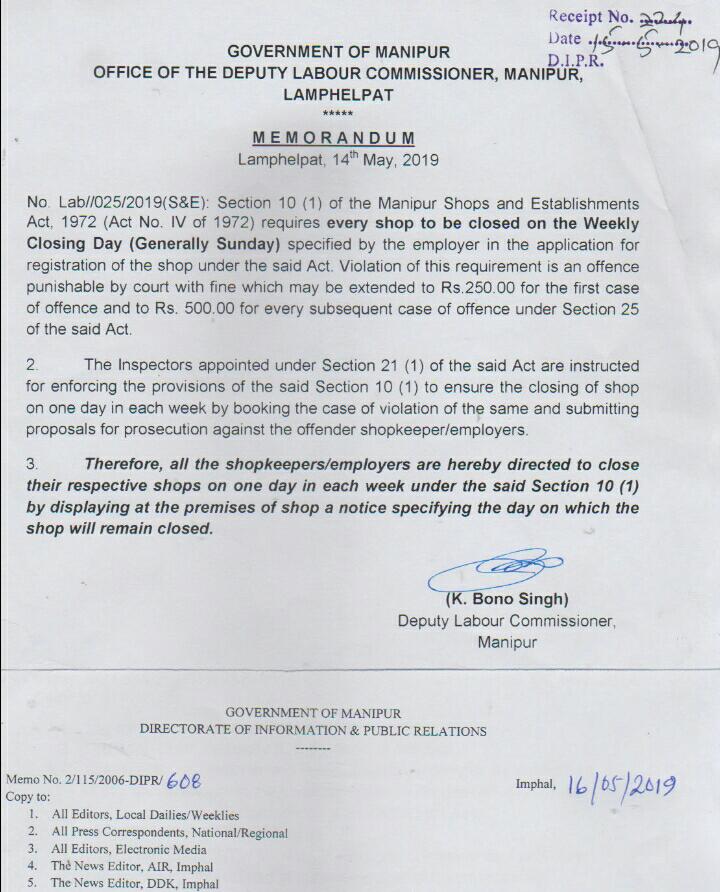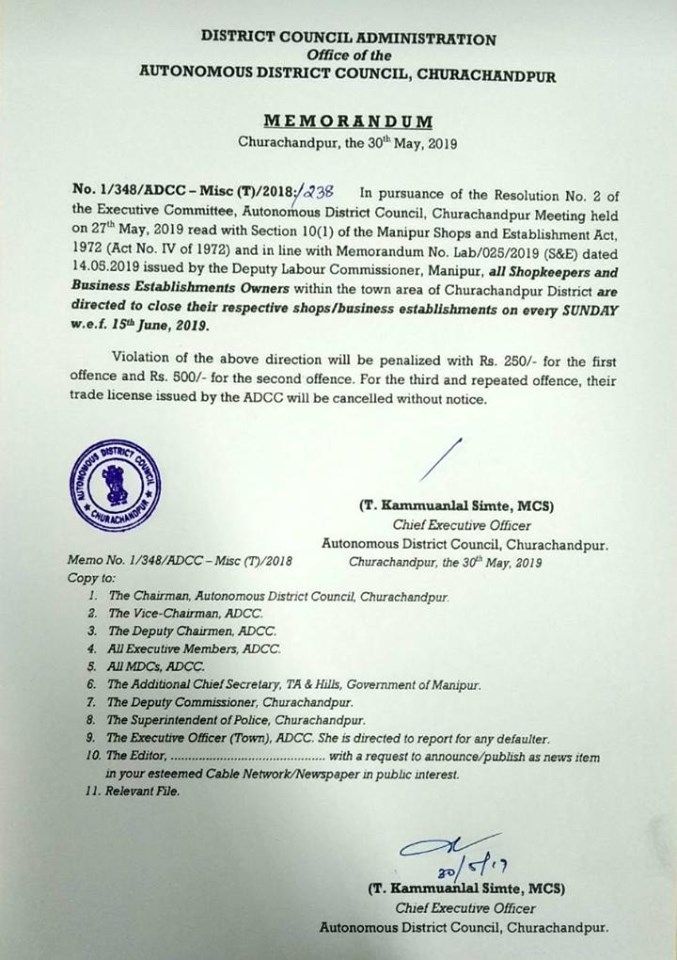ADCC passed Sunday Closed law in Churachandpur. Religious minority persecuted.
By Ginza Vualzong.
Last Sunday, the trade license of one Chicken seller was torn. One shopkeeper was asked to go to Israel for being a Sabbath observant.
Lamka 12 July 2019 | Ever since the Autonomous District Council, Churachandpur (ADCC) passed the ‘Sunday Closed’ law in the town of Churachandpur, it has become the hottest topic of debate in the town. With the ADCC task force or volunteers persecuting those who do not comply with this law, there is a mixture of reactions from the people, with one side condemning the act of the ADCC and the other supporting their actions. Yesterday, the biggest TV channel in the town – Hornbill Cable Network even had an inter-college debate on the same topic – Sunday Closed.
On 30th May 2019, the Autonomous District Council, Churachandpur passed a law directing all shopkeepers and business establishments owners within the town area of Churachandpur District to close their respective shops/business establishments on every Sunday w.e.f. 15th June 2019. This directive was in pursuance to the memorandum of the Deputy Labour Commissioner dated 14 May 2019, urging all the shopkeepers in Manipur to close their shops on any one day in a week as per section 10(1) of the Manipur Shops & Establishment Act. 1972. Any violation of this law or direction came with a fine of Rs 250 for the first offense and Rs 500 for the second offense. For the third and repeated offense, their trade license issued by the ADCC will be canceled without notice.
Although Christians are the religious majority in Churachandpur, there are other religions too. There are people who practice Hinduism, Islamism, Judaism, and Messianism. While the Christians rested on Sunday, the people who follow Judaism and Messianism who are simply known as ‘the Sabbath’ rested on Saturday. The Hindus and Muslims although does their poojas and namaz, they do not have a specific day of rest. So, the only religious group that needs an exemption from the Sunday closed law are those that worship on Saturday.
Though the Manipur Shops and Establishments Act, 1972 and the Labour Commissioner of Manipur clearly mentioned “Every shop shall be closed on one day in each week” without specifying any particular day of shop closure, the ADCC specifically directed all shops to be closed on Sunday, intentionally or not, added religious color to the law by favouring the Christian majority in the town. This led to many difficulties for the religious minority who rested on Saturday in particular. As they have already closed their shops on Saturday, to close an additional day on Sunday as per the ADCC directive would make them close their shops for two days, which would result in great financial losses. By closing their shops on Saturday, the Sabbath Day observers have already fulfilled the requirement laid down by the Deputy Labour Commissioner and are in compliance with the Manipur Shops and Establishments Act, 1972.
Foreseeing the possible consequences of the ADCC Sunday Closed Law, the observer of the Sabbath Day submitted a joint memorandum to the ADCC on 18th June 2019, requesting an exemption for the people who rested on the Sabbath to open shops on Sunday. With this effect, on 23rd June 2019, the ADCC announced in the Local TVs and newspapers that the Sabbath observer can open their shops on Sunday by putting a distinct sign “Saturday Closed”. There was also a face to face meeting with the Chairman, CEO and Vice Chairman of ADCC by the same group on the 28th June 2019 to follow up their memorandum. The outcome of the meeting was that “the ADCC would have a mutual understanding for the Sabbath day observers” and that the ADCC would not give any written exemption for them. Just like a stab in the back, the very next day on 29th June 2019, the ADCC published a new memorandum omitting the Manipur Labour Commission direction and the Manipur Shops & Establishments Act. It quoted the Manipur (Hill Areas) District Council Act, 1971 where the ADC was given the power to administered the maintenance and management of the markets and fairs in their jurisdiction. In addition, they further gave exemptions to life-saving establishments and recreational facilities like parks, hotel, etc. and not to the people who genuinely asked for exemption based on their religion.
To add salt to the wound, the task force set up by the ADCC in their follow up of the Sunday Closed law were seen vandalizing vegetable sellers in the market, threatening and seen using languages that hurt religious sentiments. In the previous Sunday, in the morning of 7th July 2019, the ADCC task force broke inside the house of Mrs. Nianglam, a chicken seller in New Bazar, Lamka. The task force threatened her not to open shop on Sunday and demanded her trade license. When she produced her license, they tore the license into pieces before the helpless lady. In the same morning, the ADCC task force has raided shops in Bethel Veng of New Lamka using threats and asked them to migrate to Israel if they are Sabbath observer. Amidst this chaos, relaxation or leniency was given to various business establishments like alcohol sellers, local TVs, internet providers, recreation parks and hotels. All these actions by the ADCC contradicted their earlier public announcement and end up hurting the sentiments of a particular religious group in the town and there was no mutual understanding from it at all.
Although the ADCC claimed that this Sunday Closed law has nothing to do with religion, by forcing its people to shut down the shops on Sunday, their law hurt a certain section of the people especially those of religious minority financially. While the majority of the people have the opportunity to open shops for 6 days, the Sabbath day observers are left with just 5 days, as they have to close shops on both Saturday and Sunday. This is inequality and discriminating as it caused great financial loss. It clearly violates the Indian fundamental rights – the rights to equality, the rights to have an equal opportunity. Further, forcing people to closed shops on Sunday is like asking someone to rest on a day which is not in accordance with their religious practice. India being a secular country, the ADCC Sunday Law clearly violates another fundamental right – the Freedom of Religion.
When the labour commission of Manipur or the Manipur Shops and Establishments Act 1972 does not specify any particular day of the week for shop closure, making a law to close shops on Sunday is conflicting the Manipur State’s law and is a clear violation of the fundamental rights of India.
It should also be noted that shops or stalls dealing with vegetable, meat, fish, dairy produce, bread, pastries, etc. are not applicable to the Manipur Shops and Establishments Act, 1972. When the state exempted these shops, it raised eyebrows to many on why the ADCC is harsh on these vendors.
It has been observed that the said Sunday Closed law was not even passed by the entire member of the Autonomous District Council of Churachandpur. It was only passed by the executive body which includes the chairman and its executive members. Such a sensitive law that could hurt religious sentiments should have been discussed and reviewed with all the stakeholders before it sees the light of the day. Also, it was learned that some of the recreational parks and hotels in the town are owned by the ADCC leaders and therefore an exemption was given to these establishments to allow their business to run on Sunday.
There was big hues and cries when the BJP government changes things around based on religion in the country or the Taliban making religious diktat in Afghanistan. We are no different if we cannot display religious tolerance in places where we hold the majority. When the ADCC can give exemption to many establishments, why are their hands tightened to those who genuinely needed an exemption from the Sunday Closed law? Is there any hidden agenda to this? The ADCC really need to revisit their Sunday Closed law and revise the law in conformity with the Indian Constitution and the Manipur Shops and Establishments Act, 1972.
The author is a freelance writer and can be contacted at This email address is being protected from spambots. You need JavaScript enabled to view it.



